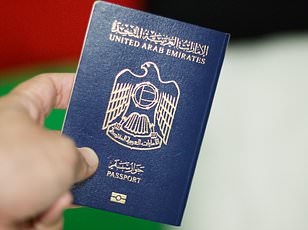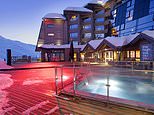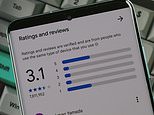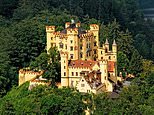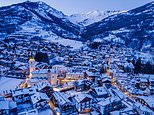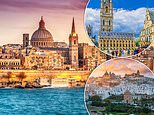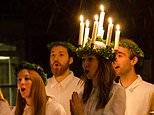My incredible life on the world's most remote inhabited island - where there are no flights in or out and crime is (almost) non-existent (though Amazon deliveries are an issue)
- Kelly Green explains the unique island lifestyle on Tristan da Cunha
- Find out why everyone has two jobs and how people spend their spare time
- READ MORE: I moved to Greece from London - here's why it's better than the UK
There's one police cell and one police officer on the island of Tristan da Cunha.
And that's just plenty.
After all, it's not like anyone can escape - it's the world's most remote inhabited island, 2,787 kilometres (1,732 miles) from the nearest slice of mainland - the southwest coast of South Africa - there are no flights in or out and passenger ships arrive just nine times a year.
Despite the isolation, local Kelly Green tells MailOnline Travel that she loves her life there, revealing that the feeling of safety is a definite plus point.
She reveals: 'I'm sitting at work now and my house is unlocked. I don't have a fear of anyone robbing me or anything like that. There's some petty crime but there's never been a murder on Tristan. I don't think anyone's been locked in the cell since I've been here.'
The island's sole police officer is known as the 'Rockhopper Copper', a reference to the northern Rockhopper penguins that frequent Tristan da Cunha. If there was a serious crime, Kelly says the suspect would have to be transported to St Helena, Tristan Da Cunha's closest island neighbour (1,300 miles/2,100km north).
It's 'really not that easy' to leave the 207 sq km/ 79 sq mile island, stresses Kelly, who moved to Tristan da Cunha from the UK in 2013.
She continues: 'The ships [to Cape Town] that we normally go on will only take 12 passengers and only come nine times a year. If you're a family of four and want to leave, that's taking up four berths and there could also be expat workers that need to go back.'
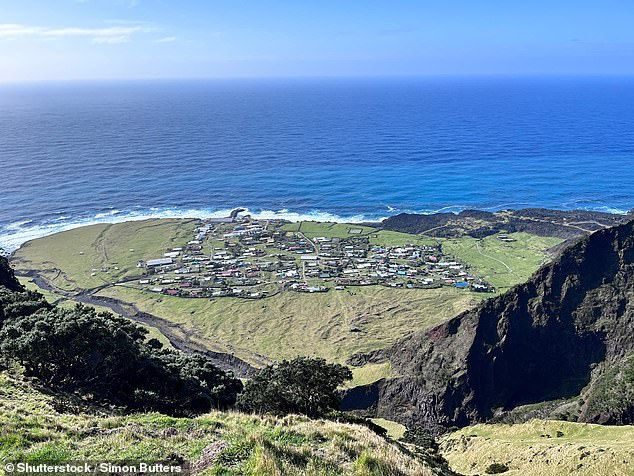
Tristan da Cunha is the world's most remote inhabited island

Kelly Green, who moved to Tristan da Cunha in 2013, told MailOnline what it's like to live on Tristan da Cunha
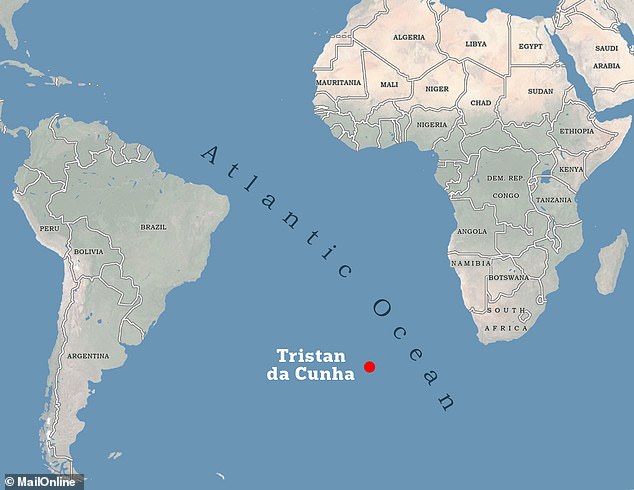
Tristan da Cunha is 2,787km/1,732 miles from the nearest slice of mainland, South Africa's southern coast
There's no chance of an airport, but Kelly says: 'We're looking into trying to make Tristan a little bit more accessible by having more ships.'
Currently, the journey to Cape Town by ship usually takes six days.
The fact that the island is an active volcano reaching a height of 2,062m/6,670ft above sea level adds to the otherworldliness of life there.
And this obviously means that the population lives under a constant threat to their lives.
The last eruption was in 1961 – a micro-second ago in geological time – and meant the entire island had to be evacuated to the UK.
Kelly explains: 'They were away for a couple of years and the majority of them returned. They didn't really like England.'
Some more recently born islanders have 'never left', reveals Kelly, although she 'tries to get off Tristan every two years' to visit family and friends in the UK.
The island's remote location means that Tristan da Cunha's 236 residents can face a long wait for supplies.
Kelly says: 'We are quite self-sufficient as a farming and fishing community and we grow most of our meat, eggs and vegetables ourselves. But we rely on supplies from Cape Town for things like tea, coffee, sweets, flour and so on. You could be planning to make something or build something, or have something go wrong with your car, and you'll have to wait several months for a part. That can be frustrating sometimes. There's no Amazon Prime.'
Imported goods can also be expensive.
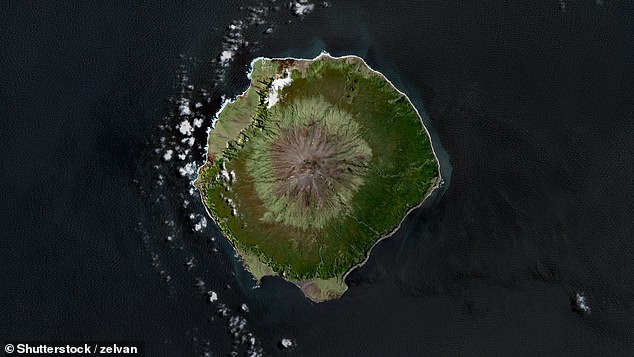
Tristan da Cunha is an active volcano reaching a height of 2,062m/6,670ft above sea level
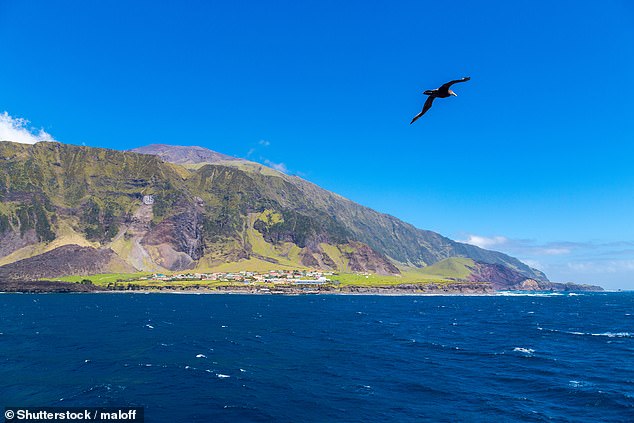
The island's remote location means that Tristan da Cunha's 236 residents can face a long wait for supplies
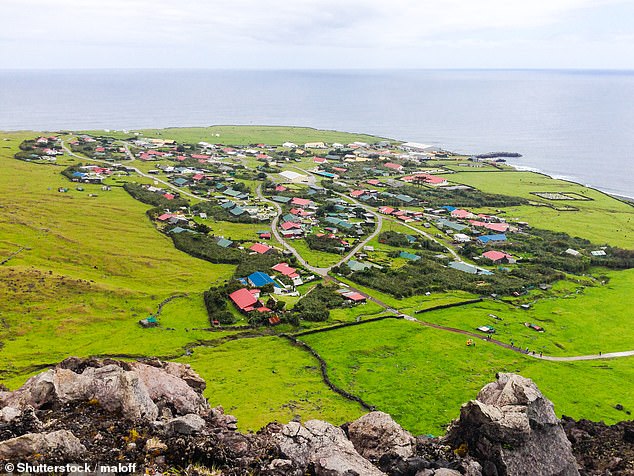
Tristan da Cunha is a farming and fishing community and residents grow their own meat, eggs and vegetables
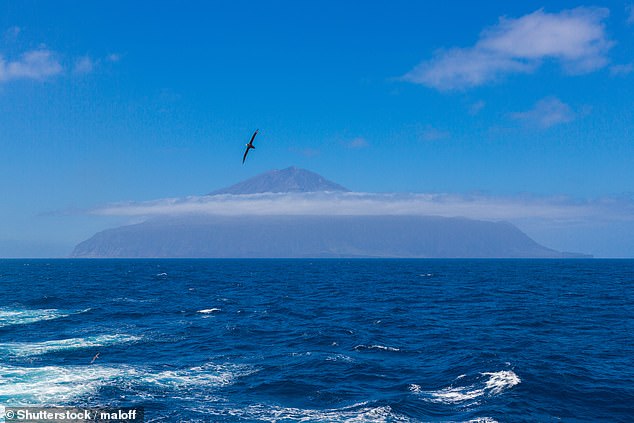
Tristan da Cunha experiences 'hurricane-force winds' in winter
Kelly reveals: 'There are some subsidised items, but it's mainly a 75 per cent markup if the item is from Cape Town. If we get the item from the UK, it's a 95 per cent markup, so that can make stuff really expensive. For example, olive oil at the minute is around £10 ($12.64) for quite a small bottle.'
What's more, as the islanders are mostly self-sufficient, people aren't paid highly.
Kelly explains: 'Even the highest paid job is about half of what the minimum wage is in the UK.'
Another challenge is the island's 'wild' weather.
Kelly says that Tristan da Cunha experiences 'hurricane-force winds in winter', with most people living in bungalows, as they can withstand the winds more easily.
She adds: 'Our harbour is only workable about 70 days of the year.'
But while life on the world's most remote inhabited island is challenging and unique, many aspects of it are remarkably normal.
Kelly reveals that residents can stream TV shows and movies, drink in a pub and there are a range of jobs on offer.
Kelly, who works at the island's tourism office, explains: 'We have all kinds of jobs - everything you think that you would need a community to have to make it functional. Teachers, nurses, bank staff, carpenters, electricians and plumbers.'
There is one difference, though. Tristan da Cunha's main source of income is Tristan Rock Lobster, which every islander plays a part in harvesting and processing.
Kelly says: 'People normally have their government jobs, then they will go and work in the fish factory or become a fisherman for the day. My husband is a carpenter but on a fishing day, he's a fisherman. I will do my normal day's work and when the boats come back in the evening, I will go and process fish.'
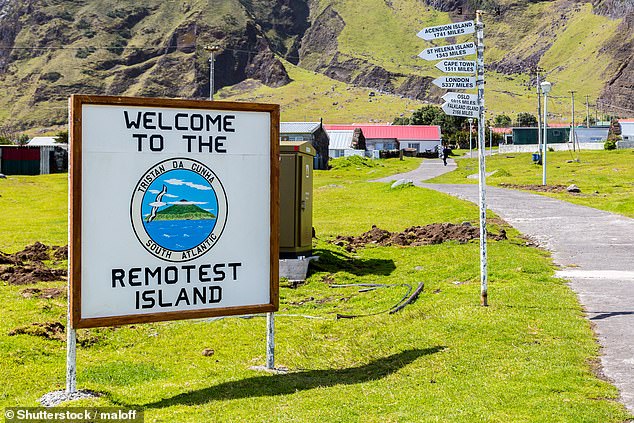
Kelly explains: 'There's not much free time because you get up quite early here, then you go to your government job, then after your government job, you're normally tending to your animals and potato patches and vegetables'
So if you think life on a remote island would leave you with endless spare time - think again.
Kelly explains: 'Surprisingly, there's not much free time because you get up quite early here, then you go to your government job, then after your government job, you're normally tending to your animals and potato patches and vegetables.'
Unsurprisingly, much of the free time residents do have is spent outdoors.
Kelly says: 'A lot of people like to have braais (barbecues). There's one swimming pool, so the kids love that in summer. People also like to go to the beach and we do a lot of hiking in the mountains.'
Residents and the tourists who visit by cruise ship also love to spend time on neighbouring Nightingale Island (40km/20 miles from Tristan), explains Kelly.
She says: 'There's just an abundance of wildlife. You can hardly move sometimes - you get on a rock and you're surrounded by penguins and seals.'
Aside from the wildlife, the volcano is the island's top attraction.
Kelly says: 'You can hike up there and it has spectacular views of the settlement.'
And when the weather's not good, the residents now have a strong enough internet connection to watch Netflix.
Kelly says: 'We're in our second month of having Starlink internet [a satellite internet service], so for the first time ever we're able to watch Netflix. Before, if I wanted to download a game on my phone, I'd have to leave it overnight, now it's like a second.'
Although the island doesn't have a restaurant and Kelly says she 'really misses being able to eat out', Tristan da Cunha does have a shop and the pub, The Albatross Bar, is 'busy with residents on the weekend' and 'very popular with tourists', who just love to say that they have been able to have a beer there.
The islanders' preferred tipples? Beer and whiskey, according to the pub manager, Randall Repetto.
Kelly continues: 'It's a very sociable life because everybody knows everybody.'
Although there are occasional disputes within the 'tight-knit' community, she explains 'people get over them really quickly as it's not like you can avoid anyone'.
Expat workers are the only outsiders to live on the island and include the doctors who staff Tristan da Cunha's one hospital, the Camogli Healthcare Centre.
Kelly says: 'It's a really nice, comfortable hospital. It's quite modern, we don't have any big CT scans or MRI scans, so the doctors here can only really do sort of minor surgeries like appendicitis, maybe some hernias. For anything big, we need to be transferred to Cape Town.' A dentist also visits the island once a year and there's a trained local hygienist.
So, what's the best thing about the island's remote lifestyle?
Kelly says: 'The best part about Tristan is definitely the freedom you feel here, the safety you feel here and the beauty of the island. It depends what you like, but I love being around wildlife and my farm animals. Just knowing that my children are safe and they can just run outside. It's a nice feeling of having that. I'm sure it's not for everybody, but it's definitely one of a kind.'


























